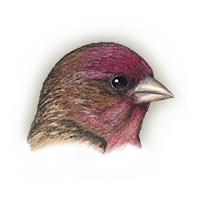 |
Purple Finch
Carpodacus purpureus |
|
|
STANFORD LOCATIONS: Uncommon and irregular migrant and winter resident in various habitats throughout campus. Occasionally seen at feeders or foraging on fruits and seeds in the Arboretum. Similar Species: House Finch. |
 |
Location |
Type |
Mating System |
Parental Care |
2ndary Diet |
Strategy |
|
|
|
|
I: 13 DAYS ALTRICIAL |
|
|
|
6 feet - 40 feet |
|
(3-6) MONOG |
MF |
FRUIT |
|
| BREEDING: | Open conif and mixed conif-decid forest, forest edge, open woodland. 1 brood in e, 2 in w. |
| DISPLAYS: | Courting male hops about dangling wings and puffing out chest. With wings vibrating rapidly and tail cocked, male softly vocalizes and may rise 6-12" off the ground, occ while holding nest material in beak and singing. |
| NEST: | Usu in conif tree in e, on horizontal branch, far from trunk. Neat shallow cup of twigs, fine roots, grass, lined with rootlets, hair, moss. |
| EGGS: | Pale greenish-blue, marked with browns, blacks. 0.8" (20 mm). |
| DIET: | Primarily seeds; some tree buds and blossoms from winter to early spring. Adds insects in spring, feeds heavily on fruit in summer. Young fed mostly seeds. |
| CONSERVATION: | Winters within N.A.; erratic in distribution. Uncommon cowbird host. Competition with House Sparrow suggested cause of decrease in New England breeding range, esp in urban and suburban areas; competition with House Finch important in disappearance from e areas where ranges now overlap. |
| NOTES: | Occ forms postbreeding unisexual flocks of 20-30. Remains somewhat gregarious during winter and may flock with siskins and goldfinches; w populations migrate altitudinally. |
| ESSAYS: | How Long Do Birds Live?; Irruptions; Masterbuilders; Bird Communities and Competition; Avian Invaders |
| REFERENCES: | Popp, 1987; Wootton, 1987. |
| Help | Abbreviations | Species-Alphabetical | Species-Taxonomic | Essays-Alphabetical | |
| Except for Stanford Locations, the material in this species treatment is taken, with permission, from The Birder's Handbook (Paul Ehrlich, David Dobkin, & Darryl Wheye, Simon & Schuster, NY. 1988). | |||||